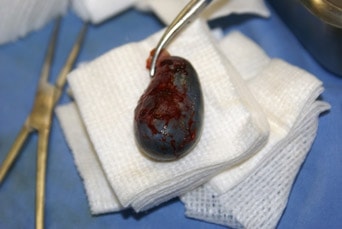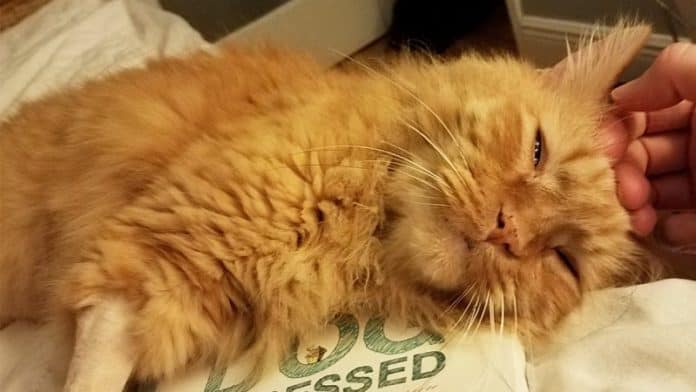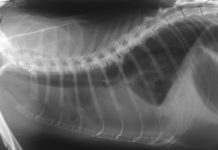Gallstones are commonly made up of calcium or some other secreted stuffs that form into small stone-like structures in the cat’s body. Furthermore, gallstones in cats is a medical condition, which may result from the stone formation in the gallbladder. The stones in the bile ducts or the gallbladder might be visible through an x-ray, or they might not. Except that there are some serious symptoms, surgical procedure isn’t recommendable for gallstones. Get to learn more about gallstones –its causes, symptoms, prognosis, and treatments –give this article a read!
Gallstones in Cats: What is this feline condition?

Even though gallstones in cats are rare to happen, the existence of large stones is one medical emergency that you should not ignore easily. This is mainly because these stones may block the bile from being released and may cause problems with the kidneys, digestive system, and liver.
Furthermore, the gallbladder of the cat is a small, balloon-shaped organ, which is located in the liver lobes. Its main function is the releasing of the bile in the digestive system, in order to aid in the food digestion. Moreover, gallstones in cats are commonly made of calcium carbonate that is mixed with some other secreted minerals and substance.
Types of Gallstones
Gallstones in cats may actually be divided into two different types that are also categorized depending on the minerals, which combine with the calcium carbonate to form them:
- Brown-pigment gallstones –a type of gallstones that are made up of calcium bilirubinate
- Black-pigment gallstones –a type of gallstones that are made up of bilirubin polymers
Causes of Cat Gallstones
There are a number of reasons as to why gallstones in cats happens in cats. These causes may include the following:
- Nutritional imbalance like the consumption of too much cholesterol or calcium
- Tumor
- Bacterial infection
- Bile sludging that causes the bile to get thicker and slow down
- Gallbladder malfunctioning
Symptoms of Cat Gallstones
The symptoms of gallstones in cats might be mild or non-existent at all, until the gallstone blocks the flow of the bile from the gallbladder. Common symptoms of gallstones in our cats include the following:
- Frequent pacing or wandering
- Frequent stretching or changing positions
- Lethargy
- Fever
- Jaundice that may present with the yellowing of the inner ears, mucus tissues, and whites of the eyes
- Abdominal pain
- Vomiting
- Weight loss
- Lack of appetite
Prognosis of Cat Gallstones
The vet may need the complete medical history of the cat. This may include any gallstone history, a thorough list of all the systems of the cat, as well as an estimated date when the symptoms first started. Due to the fact that a lot of the symptoms of gallstones are also existent with more severe illnesses like gallbladder inflammation, liver disease, pancreatitis, inflammation and bile duct, these conditions may need to be excluded.

A CBC, urinalysis, and biochemical profile may be required by the vet. These lab exams may look for the possible presence of an infection, which might be causing the gallstones, as well as help in ruling out some other illnesses. Since most of the gallstones do not contain sufficient minerals to get detected on a radiograph, x-rays are seldom done, yet might be needed if the vet suspects some other condition, which is identifiable through an x-ray.
Moreover, ultrasound imaging may also be done of the abdominal area of the cat. Further, the ultrasound may look for the existence of gallstones in cats, liver inflammation, thickening of the gallbladder walls, blockage of the bile duct, as well as an enormous bile duct swathe. Additionally, an ultrasound may also detect gallstones, which are two millimeters larger.
Treatment for Cat Gallstones
No Treatment
The small gallstones, which aren’t causing symptoms or digestive issues might not need whatever treatments. These gallstones are commonly present during an ultrasound for some other condition, just like pregnancy.
Medications
Antibiotics may be prescribed to the cat, in order to clear the infections or bacterial complications, which are causing the gallstones to develop. Additionally, antibiotics may also be prescribed right before a surgical procedure, in order to avert infection from happening after the surgery.
Intravenous Supplements
The vet may also prescribe that the cat should receive intravenous supplements, other than medications. Vitamin K1 may be given, in order to treat jaundice, as well as vitamin E to help in reducing inflammation to the gallbladder and liver.
Surgical Procedure
In the event that the gallstones in cats are blocking the bile duct, are causing a cystic duct obstruction or are causing some inflammation, a surgery might be necessary. Further, the vet may determine the best surgical procedure for the situation of the cat. In case the gallstone has developed in the past, the vet might elect to get rid of the gallbladder of the cat. In case it is the first time that the cat experiences gallstones, the vet may only get rid of the gallstones, retaining the gallbladder.









